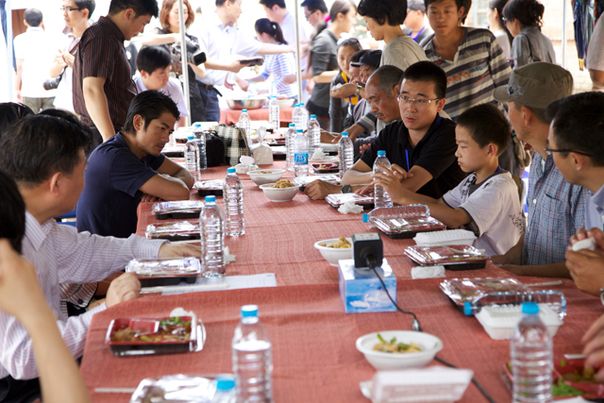Estrangement in the Land of Magic
Can a Chinese educational and cautionary tale about AIDS reach the broader audience of the Berlinale Panorama?

TOGETHER
Berlinale Forum’s TOGETHER (ZAI YI QI, China) has a very clear purpose: to educate Chinese people about AIDS and to draw attention to the discrimination patients in China suffer. As important and humanistic as this goal is, it may seem quite outdated and a bit too local. In many countries AIDS is no longer considered the major threat it used to be in the eighties when it was an unknown mortal disease, and the discrimination against people with AIDS is not as strongly felt in Europe or America as it is in China.
But director Zhao Liang successfully transcends the limitations of his subject matter, building upon them by using many variations of the same basic idea. The film takes place on the set of an upcoming blockbuster, TALE OF MAGIC (MO SHU WAI ZHUAN, China) by Gu Changwei, where the crew includes local AIDS patients who are given an opportunity to work alongside other artists and craftsmen. Liang adds further interviews by involving patients he has met on discussion forums on the Internet, all contributing to a large and lively portrait of Chinese society. Volunteers share their experiences as AIDS patients, explaining how they were infected and why they tend to keep their disease a secret. We get to see the varied ways the virus is spread, from sexual transmission to blood transfer or child birth. This is essential because the reason patients are so harshly discriminated against is the fact that AIDS is still considered a disease for sexually promiscuous people only.
But such richness can be dangerous if it turns the film into a monotonous compilation of touching interviews that don’t follow a narrative flow. To avoid such a misfortune, Liang selects a trio of interviewees and focuses on their stories as the film progresses. His protagonists turn out to be a charming boy chosen for a leading role in TALE OF MAGIC, a forum administrator nicknamed Invisible Angel and a set stand-in who’s forced to leave when his medication has to be changed. Each reflects a different attitude, as one is brave enough to appear in a major film while another is afraid to reveal her real name. What’s common to all is their sincerity and hunger to be loved, or at least accepted, by the people they used to live among.
Liang’s approach is surprisingly pleasant and caring, but the film takes a minor blow when educational elements (yearly stats and medical information) are introduced. Still, it’s difficult to judge the film for its not-too-insistent tutoring after seeing how obvious the need for further knowledge is. Those informational scenes only enhance this lovely documentary, making its case adequately clear without lessening its tenderness.


301 Moved Permanently